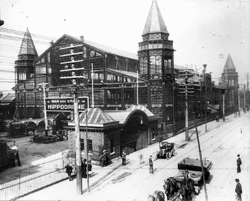
Victorian Era - Autograph Books, Architecture, and Mystery




The Autograph Amicorum
As a Christmas gift, Amelia received an Album Amicorum, an autograph book, full of empty pages waiting for signatures and poetic lines from friends and family. A fitting present for a woman who was about to embark on a 667-mile journey away from her home, this autograph book signified a new chapter in her life as well as a physical remembrance of those she left behind. Teachers, cousins, and sisters each took to a page to write their farewells, written in a style typical of the Victorian era.
On December 25th, 1878, Amelia Hoenig received a small red autograph book inlaid with gold and silver accents. A butterfly and bouquet of flowers decorate the front cover, framed with a silver border. The first page holds a sticker of four roses on a vine that covers the entire page. In the bottom left hand corner, a date December 25, 1878 has been inscribed. This autograph book over the next few years would subsequently be filled with over forty inscriptions from friends and family. These inscriptions ranged from signatures to eight lines of poetic verse.
For more information on Amelia's Autograph Book, read this paper written for a previous assignment.



Marie, Joseph Stillburg's sister who lived in Austria. Notice his handwriting on two of the images. The advent of photography in the 19th century made it possible for a brother across the ocean to be able to "see" his sister thousands of miles away.

Joseph's Pocket Watch
Notice the three fobs on the ribbon. These fobs would have hung outside of the pocket of a vest for ornamental purposes only albeit the keys could have been used on the pocket watch. The portrait is of an unidentified man, perhaps his father.
From Trieste to Pittsburgh: The Effects of Cholera
This Pittsburgh Dispatch article
from Sunday August 28th, 1892 features an interview with
Joseph Stillburg talking about his experience as a soldier in Trieste when there was a cholera outbreak. The Pittsburgh's Board of Health is said to have been founded from after the cholera outbreaks of 1851. In 1891, there was a special hospital for cholera patients and a urgency for disinfecting the city through recommendations of daily tasks such as better
garbage collection.
Information from Jacqueline Karnell Corn's "Social Response to Epidemic Disease in Pittsburgh 1872 - 1895." PSU Journal.

Joseph in uniform circa 1860s.




Designing Pittsburgh
Joseph Stillburg, as the article above stated, was a well known architect in Pittsburgh. Below are some of his designs. His most known work would have to be designing Exposition Hall, Pittsburgh's venue for various expositions. This building would have followed the trend of the times of events such as the 1893 Chicago Columbian Exposition. To the right are commemorative coins of the event.





The building where Joseph Stillburg worked.

Exposition Hall in 1898.
Suicide at the Stillburgs'
This newspaper article from the Pittsburgh Daily Post on Sunday October 31, 1897 is startling. This article is a great example of an event that's context has been lost to time. No other information regarding Antoine Kirsch's suicide could be found.

Joseph and Amelia's first son, Joseph, only lived less than one year, having been born October 26, 1880 and dying on October 14, 1881. He is buried like Amelia and Joseph in Woodlawn Cemetery in Green Bay, Wisconsin.

Flower motifs held immense weight during the Victorian Era. On Joseph's grave, notice the morning glories and the roses. These flowers stood for values such as resurrection, mourning, and love. The buds at the end of the grave symbolize someone who died young and the daisies represent gentleness and innocence.
The First Son
October
The Family House
The Stillburgs lived in a big house on top of a hill on the outskirts of Pittsburgh in the area of Northside. Below is the only image of the house in the collection. The house is still standing and functions as community center for the neighborhood of Northview Heights. If you look closely in other pictures throughout the website, you can catch glimpses of the house closer up. According to the maps below, it was a frame house.

1897 Parts of Reserve Twp, Allegheny City. Plate 16
1897 Parts of Reserve Twp, Allegheny City. Plate 16





